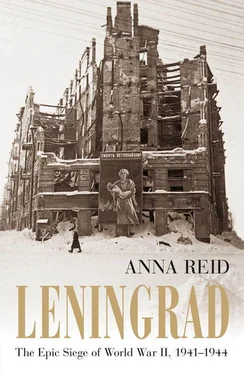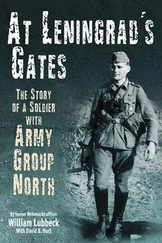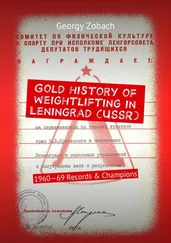Things didn’t work out that way not only because Hitler was a fantasist, but because he radically misunderstood Soviet society. He vastly overestimated the power of Russian anti-Semitism, and underestimated patriotism and national feeling. He failed—in common with mainstream British and American opinion of the time—to see that most Russians, despite having been terrorised and impoverished over the preceding two decades by their own leadership, would tenaciously resist foreign invasion. ‘Smash in the door!’ he famously declared, ‘and the whole rotten structure will come crashing down!’ The crass slurs—‘the Slavs are a mass of born slaves’; ‘their bottomless stupidity’; ‘those stupid masses of the East’—endlessly repeated in his mealtime diatribes were a measure not only of his racism, but of intellectual laziness, of complacency in the face of a vast, fast-changing and secretive country of which he and his advisers knew very little. His misconceptions, ironically, mirrored Soviet ones about Germany: ‘Too high hopes’, one of Hitler’s generals recalled later, ‘were built on the belief that Stalin would be overthrown by his own people if he suffered political defeats. The belief was fostered by the Führer’s political advisors, and we, as soldiers, didn’t know enough about the political side to dispute it.’ {15} 15 Field Marshal von Kleist, in Basil Liddell Hart, The Other Side of the Hill: Germany’s Generals, Their Rise and Fall , p. 182.
As the war progressed, rivalry increasingly broke out not only between the multiple, overlapping agencies responsible for the occupied Soviet Union, but between ideologues, intent on their Führer’s grand vision of extermination, and pragmatists (many of them Baltic German by background), who advised something closer to the traditional colonial policy of co-opting ethnic minorities—in particular the Ukrainians—and reversing unpopular Communist measures, such as the closure of churches and collectivisation of land. But even if Hitler had understood the Soviet Union better, it is likely that he would have ignored the pragmatists’ advice. The attack on the Soviet Union had rational justifications: it was to bring Germany agricultural land and oil wells, and eliminate an inimical regime. But it was also about race: a Vernichtungskrieg , a war of extermination. Bolsheviks, Jews, Slavs—they were vermin, brutes, cankers, poison; their very existence anathema to the National Socialist dream. Liquidating or enslaving them was not just a means to territorial domination, but part of its purpose.
On the Sunday night of 22 June, as on every midsummer night, darkness did not fall on Leningrad. The sun slipped below the steel-blue waters of the Gulf of Finland to the west, but the sky above the rooftops remained a luminous pinkish violet, held in suspended animation until the small hours of the morning, when the sun rose again and bathed the city in full, disorienting daylight. At 2 a.m., Yelena Skryabina was woken by the deafening sound of anti-aircraft guns. Believing (wrongly—it was only a drill) that an air raid was in progress, she and her family joined their neighbours in the stairwell of their apartment building:
Lyubov Nikolayevna Kurakina orated above the din. Her husband, a former Party member, has already served two years on a charge of counter-revolution. Her Communist sympathies were shaken by her husband’s arrest, but last night, under the roar of the anti-aircraft guns, she forgot all her earlier resentment. With conviction she extolled the invincibility of Soviet Russia…
Anastasiya Vladimirovna, our former landlady, sat on a large trunk, smiling sarcastically. She made no attempt to hide her hatred of the Soviet government and sees in this war and eventual German victory our only possible salvation. In many respects I share her views, but that smile irritates me. Two sentiments entered the controversy: the wish to believe that Russia will not be destroyed, and the realization that only war offers any actual possibility that we will be freed from the terror of the regime. {1} 1 Yelena Skrjabina, Siege and Survival: The Odyssey of a Leningrader , p. 4.
Skryabina was not the only Leningrader to have mixed feelings about the German attack. Everywhere, anger at Nazi aggression combined with anger at the government’s evident unpreparedness for war, and among some, like Skryabina’s reckless neighbour, with the feeling that German occupation might be a price worth paying for the end of Bolshevism.
When Likhachev returned to the city on Monday he found it sombre and quiet. In the university’s Russian Literature department—housed in what had once been the customs house on the eastern point of Vasilyevsky Island, now called ‘Pushkin House’—people were unusually talkative, though they ‘looked around’ as usual before speaking out: ‘Everyone was surprised that literally days before a very great quantity of grain had been sent to Finland—it had been in the papers… A. I. Grushkin talked most, making fantastic suggestions, but all “patriotic”.’ At the Kirov Works informers recorded the reactions of ordinary workers. Speakers at a public meeting were predictably resolute: ‘I cannot find words to describe the unthinkable treachery of the Fascist dogs’, declaimed one. ‘Our duty is to unite around the government and Comrade Stalin, to forget about ourselves and put all our strength into working for the front.’ But in private, people were angry and frightened:
Comrade Martynov was overheard saying in private conversation: ‘See, we feed Hitler our bread, and now he has turned against us!’ E. P. Batmanova declared that she had heard that Hanko [a Soviet naval base west of Helsinki] has been taken by the Germans. Party members present rebuked her harshly, and explained to other comrades that such conversation is harmful and in the interest of enemy elements.
The following day ‘canteen director Comrade Solovyov delayed lunch… because of problems with transport. Among those waiting the following conversation was overheard: “It’s only the second day of the war, and already there’s no bread. If the war goes on for a year we’ll all die of starvation.”’ {2} 2 Andrei Dzeniskevich, ed., Leningrad v osade: sbornik dokumentov , doc. 197, p. 466.
Overwhelmingly, though, the public mood in the first few days of the war was one of genuine patriotism. Even before orders for general mobilisation went out on 27 June, queues of would-be volunteers formed outside local Party offices, military recruitment centres and factory headquarters. Altogether, some 100,000 Leningraders volunteered in the first twenty-four hours of the war, well before officialdom had had a chance to call them up. {3} 3 Richard Bidlack, ‘The Political Mood in Leningrad during the First Year of the Soviet-German War’, The Russian Review , 59, January 2000, p. 99.
By Thursday 26th the Kirov Works was able to report that it had received over nine hundred applications for entry into the works militia and 110 new applications for Party membership. The district recruitment office had received over one thousand requests, from women as well as men, to be sent to the front. {4} 4 Dzeniskevich, ed., Leningrad v osade , doc. 197, p. 466.
On the day war was declared eight-year-old Igor Kruglyakov went with his father and uncles to the Karl Bulla photography studio on Nevsky Prospekt, to pose for a family portrait. The next day, he remembers, ‘we went over to the Petrograd Side, to accompany my father to the military commission. I remember that voyenkomat , the courtyard was surrounded by buildings all the way round. There was a little checkpoint and he was quickly registered somehow or other. He went off that same evening.’ {5} 5 Interview with Dr Lyuba Vinogradova, Moscow 2007.
Читать дальше











